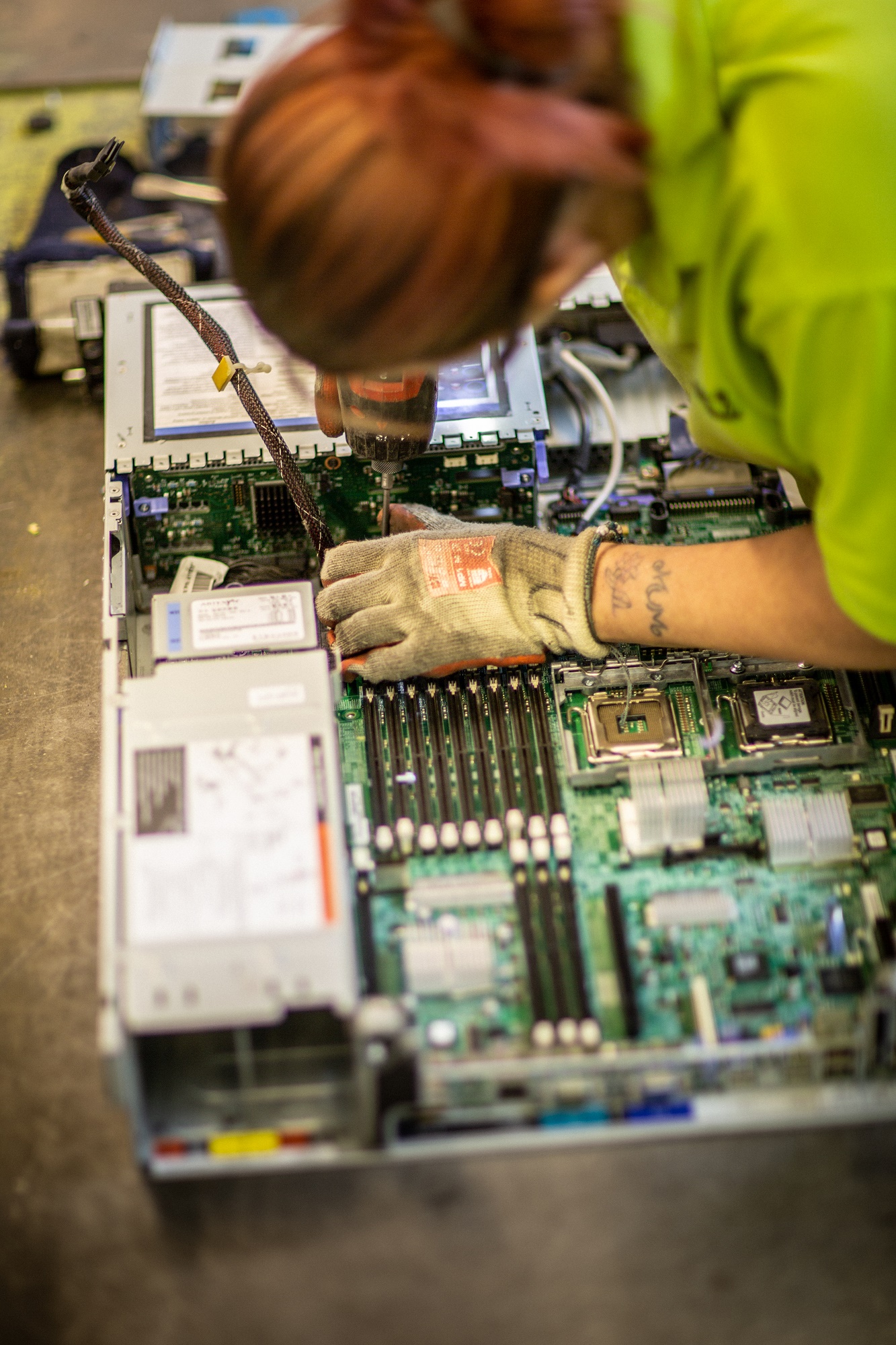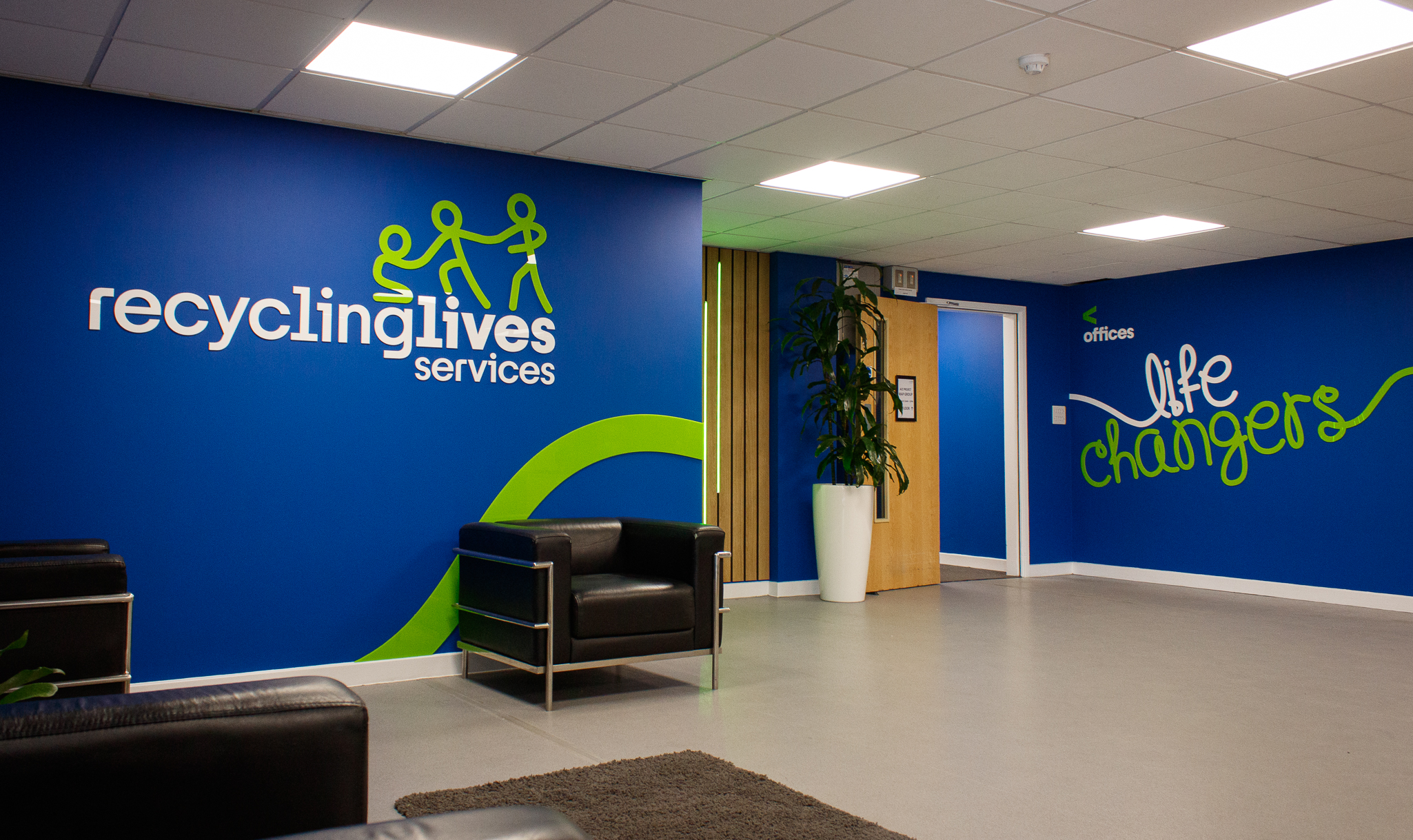From waste to work: How construction’s supply chain is training the next workforce

As Prisons Week shines a light on rehabilitation, Recycling Lives Services shows how prison leavers are gaining skills and careers in the construction sector.
After more than 20 years struggling with addiction and two six-year prison sentences, Mark — a pseudonym — had seen his life narrow to a cycle of short-term fixes and long absences.
“I missed so many things that mattered — birthdays, my dad’s funeral. The guilt eats at you. Back then, I couldn’t see a way out.”
When he signed up for cleaning duties in prison, it wasn’t much — a mop, a corridor, a bit of order in the chaos.
“It sounds daft, but it gave me pride. I started turning up early, keeping my area spotless, trying to do a proper job.”
That routine became his first step towards recovery.
Mark then applied for a place on the Recycling Lives Release on Temporary Licence (ROTL) programme, which allows prisoners nearing the end of their sentence to work in the community during the day before returning to custody.
“I failed the first interview, but then a mate who already worked on the programme spoke up for me, and I was given another chance.”
On release, Mark joined Recycling Lives Services (RLS) as a battery sorter.
“The ROTL programme was the bridge for me. It gave me the confidence that with work I really could change, really could rebuild my life, even after so long.”
He progressed to team leader, gained a forklift licence, and is now employed full time in one of RLS’s commercial recycling facilities. He’s been clean for over a year and is saving money.
“They gave me the chance to help myself. It’s real work, proper work. That’s what makes the difference.”
With construction facing a skills gap of more than 250,000 workers by 2028, according to the Construction Industry Training Board’s latest forecast, contractors are re-examining how they deliver measurable impact. Social value now accounts for at least 10 per cent of tender evaluations across central government contracts — and up to 30 per cent in some regional frameworks. At the same time, the industry faces pressure to demonstrate social-value KPIs while maintaining programme and budget. Integrated supply chain solutions that can deliver both are increasingly attractive.
As Prisons Week shines a light on rehabilitation, Mark’s story illustrates a model gaining traction across construction: embedding social value within commercial operations rather than treating it as an add-on. With the Procurement Act 2023 requiring contractors to evidence social outcomes in public tenders, and persistent labour shortages forcing employers to look beyond traditional recruitment pools, engaging with rehabilitation is fast becoming a practical way to meet social-value requirements while addressing workforce pressures.
Recycling Lives Services has been refining an answer in this area since 2011. Working with Recycling Lives Charity’s workshops inside six UK prisons, RLS uses its commercial waste contracts to create opportunities for structured training, paid work, and long-term support for people in custody. The model traces its roots to founder Steve Jackson OBE, who began combining recycling work with rehabilitation in the early 2000s. This led to the creation of Recycling Lives Charity in 2008 and the first prison-based workshop at HMP Kirkham three years later.
Though two separate legal and operational entities, the business and charity work in tandem through the HMP Academies programme, allowing people in custody to gain skills, earn wages, and build savings while contributing to the circular economy.
The Charity delivers rehabilitation, housing, and employability support before, during, and after custody, while RLS provides the commercial infrastructure, support, and logistics that connect those efforts to real contracts. Delivering commercial contracts allows the Charity to generate profits to fund its wider rehabilitation work, making the partnership a rare model in which commercial performance directly fuels rehabilitation and employment.
Most tier-one contractors now have social-value frameworks in place, but delivery depends on the strength of their supply chain. By working with partners whose core operations create measurable impact, both main contractors and their subcontractors can demonstrate tangible outcomes. For smaller firms, aligning with socially responsible suppliers like RLS also makes them more attractive partners to tier-ones seeking evidence of impact across every tier of delivery.
Construction generates vast quantities of waste, typically 50 to 100 tonnes for every £1 million spent, according to WRAP’s construction resource efficiency data, all of which must be certified, documented, and recycled to meet BREEAM and ISO 14001 standards. Within that system, Recycling Lives Services outsources to the prison workshops and operates its own community sites that process material from live construction and infrastructure projects, turning a compliance obligation into practical training and employment.
In the past decade, the programme has supported more than 2,500 people. Around 130 are currently active across the six prison workshops, with a further 18 working in the business’s sites on Release on Temporary Licence (or day release). Participants receive accredited training in logistics, materials handling, and health and safety, and earn wages for their work.
Forty per cent of earnings are automatically set aside as savings, often providing enough for a deposit on a flat upon release, while the remainder gives them income while in custody and a financial foundation to build on. The result: a reoffending rate of around 5 per cent among those who complete the programme, compared with a national average of roughly 25 per cent. Two-thirds move into employment upon release, many within construction and logistics.
The prison workshops are sometimes seen as a charitable add-on, but with around 15 per cent of Recycling Lives Services’ workforce on Release on Temporary Licence, its rehabilitation commitment is central to day-to-day operations. Materials from major construction and infrastructure projects are handled under accredited supervision at both prison and community sites. Clients range from Wates Construction and BT to British Gas and Amey. For these companies, organisations like Recycling Lives Services offer compliance with waste and data-security standards that also deliver verified social impact.
“Employment is one of the strongest factors in reducing reoffending, but only if the work is meaningful and sustainable. People need to feel valued and part of something real. When you combine proper rehabilitation support with genuine commercial opportunity, the outcomes speak for themselves.” — Victoria Blakeman, CEO of Recycling Lives Charity
Recycling Lives sits within a broader industry evolution. The government’s Unlocking Construction initiative has seen employers run events inside prisons to promote careers in the sector, while companies including Kier and Gallaway have established programmes offering training, day-release placements, and employment for prison leavers. Within waste management, SUEZ and Veolia have built partnerships with prisons, though the integration of long-term rehabilitation within commercial recycling at the scale RLS and Recycling Lives Charity operate remains uncommon.
The Charity also works with contractors and facilities-management firms to develop new day-release placements and post-release employment pathways. For an industry that quite literally builds the foundations of communities, the opportunity to help rebuild lives while meeting procurement requirements and addressing labour shortages is one it cannot afford to overlook.
“If I wasn’t working, I was using. This gave me a reason to stay straight and clean. You need people to give you a chance, but you’ve got to believe in yourself enough to take it and stick with it, when it comes.”




